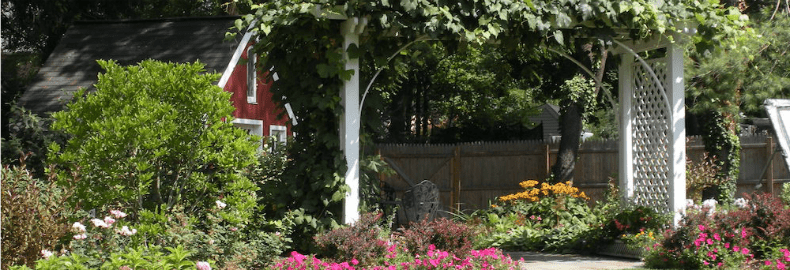 Regular pest control should be a part of your routine lawn care and maintenance procedures for your home. Although your lawn appears lush and green, it’s susceptible to insects, diseases and outdoor pests at any time, especially when your lawn is malnourished or overgrown. To prevent damages to your lawn and landscape, talk to a professional landscape company who can provide year-round lawn care pest control in Bergen County for your home. Here are five expert tips on pest control solutions.
Regular pest control should be a part of your routine lawn care and maintenance procedures for your home. Although your lawn appears lush and green, it’s susceptible to insects, diseases and outdoor pests at any time, especially when your lawn is malnourished or overgrown. To prevent damages to your lawn and landscape, talk to a professional landscape company who can provide year-round lawn care pest control in Bergen County for your home. Here are five expert tips on pest control solutions.
1. Determine Your Pest Control Needs
When you’re dealing with outdoor pests around your home, it’s often difficult to determine the type of pests causing the problems and the severity of the infestation. There are so many types of outdoor pests that can cause damages to your lawn and property. There are common insects, diseases and outdoor pests that can invade your lawn and landscape throughout the year. Take a look at some of the most common pest threats that require lawn care pest control in Bergen County.
Insects
- Chinch Bugs – In August and early September, chinch bugs attack thick, sunny areas of grass and inject a toxin that loosens grass roots from the soil. If you notice your grass turning yellow or reddish-brown, and lifting up easily from the soil, like a patch of carpet, you probably have a chinch bug problem.
- Grubs – In June and early July, grubs can invade your lawn and cause brown patches that will become extensive by fall. Grubs, small worm-like insects that resemble caterpillars, live in the soil beneath the grass. If your grass looks yellow-brown and scorched, and sod lifts up easily around the scorched patches, you probably have a grub infestation.
- Japanese Beetles – In June, beetles invade plants and trees. They don’t eat grass, but they lay eggs in the soil, and the eggs turn into white grubs in early to mid-spring. Grubs live in the soil, but eat your grass and its roots. If you notice signs of skeletonized leaves, that’s usually a sign of a Japanese beetle infestation.
- Army Worms – During the fall when temperatures are cool and air is moist, army worms feed at night in your lawn. They resemble caterpillars with a long, dark stripes down each side of their back. These small, harmless looking insects usually invade in large numbers, and they can eat your grass right down to the soil, leaving you with brown or bare spots in your lawn.
- European Crane Flies – Resembling oversized mosquitoes, crane flies hatch their larvae, called leatherjackets, in the fall when they feed on grass roots during winter. By spring, your lawn can have yellow spots or missing turf. Check the top three inches of sod between February and mid-May, especially in shady and wet areas that are particularly vulnerable.
Plant Diseases
Most lawn and plant diseases are caused by some type of fungi. Fungal spores can be easily spread by rain, wind, insects, contaminated soil and shoes from people walking around on wet grass. Here are common fungal diseases that may require professional lawn care pest control in Bergen County to eliminate and control problems and lawn damages.
- Dollar Spot – A fungus that looks like silver dollars, it thrives on malnourished lawns. Look for small, white, spots that resemble cobwebs in the morning.
- Rust – Rust fungus usually appears on grass blades in late summer. Grass blades turn orange or reddish-brown, and as the fungus progresses they turn black. Glass will thin, wither and die.
- Plythium Blight – This fungus typically attacks freshly seeded lawns in fall and spring. It causes black, wet patches of flat grass up to 2 feet wide, and grass usually dies within 24 hours.
- Fusarium Patch – This fungus is usually seen in late winter and early spring. It causes round patches of dead grass that range from one to three inches in width. It often leaves a white or pink colored mold on grass after winter snows.
- Fairy Ring – This fungus, typically found in fall or spring, can cause circular patches in your lawn that turn bright green. The damaged areas resemble rings, and can often reach up to 50 feet in width if not treated.
- Mushrooms – Mushrooms, commonly seen in many lawns, grow in moist conditions. They will not harm your lawn and can be easily mowed down with regular lawn maintenance.
Garden Pests
Although garden pests are often cute little critters, they can be destructive to your lawn and garden. Without using lawn care pest control in Bergen County, garden pests are difficult to get rid of. To protect your garden or landscape that contains fruits and vegetable, flowers and edible plants, invest in organic pest control solutions that focuses on safe, chemical-free treatments.
- Chipmunks – Chipmunks, common in Bergen County, usually eat berries, grains, seeds and insects, but they will also eat seedlings and flower bulbs. These burrowing critters can do extensive damage to your lawn and landscape, especially if there’s a lot of them.
- Moles – Moles dig deep tunnels by pushing underground soil. They feed on insects like grubs and chinch bugs that live in the soil. Moles will tunnel through your entire lawn and garden leaving behind mounds of raised soil as they feed.
- Rabbits – Rabbits are the most frequently seen garden pest, often observed browsing in residential Bergen County gardens. They may damage flowers, vegetables, shrubs and trees, especially in the spring when young, tender plant materials are growing.
- Raccoons – Raccoons eat vegetation, but they’re attracted to fruit and food as well. They are diggers, and often look for safe habitats under your house or deck where they feel safe, especially when they are bearing their young.
- Deer – Deer choose to graze mostly on vegetation, but they will also eat fallen fruit and berries. Although they’re not dangerous, they can cause significant damage to your garden and landscape. You may need lawn care pest control in Bergen County to get rid of deer in your landscape.

2. Eliminate Dangerous Outdoor Pests
Insects and outdoor pests not only cause problems in your lawn and landscape, but the can also cause harm to your children and pets. Dangerous outdoor pests should be eliminated as quickly as possible to protect your family and pets. In you see any of these outdoor pests in your yard, contact a professional who can provide lawn care pest control in Bergen County right away.
Snakes
Snakes are commonly seen in more remote or rural landscapes, but they are not uncommon in urban landscapes. In urban areas, they’re usually noticed by shedding outer skins left in the lawn or garden. Smaller snakes like garter snakes and midland brown snakes are more common in Northern NJ landscapes where they find insects, slugs, small rodents, frogs and bird eggs for food. Although many snakes aren’t poisonous, you may not know how to recognize the poisonous ones, so you don’t want them around family and pets.
Spiders
Spiders are considered to be a nuisance pest and most are not dangerous, but if they bite, the bite can cause a reaction like swelling, itching, redness and mild pain around the site. Black widow spiders and brown recluse spiders, both common in Northern NJ, are considered to be dangerous because their venom is powerful enough to cause a serious reaction. If you’re bitten by a poisonous spider you should seek medical attention immediately.
- Black widow spiders are a poisonous species that are black in color and have a distinctive red hourglass shape under their abdomen. They are 1 ½ – 1 3/8th of an inch in length and have a “round” body shape.
- Brown recluse spiders are dark brown in color with a violin-like marking on their back, they range in size from ¼-inch to ½-inch. They spin strangely irregular shaped webs, and are very poisonous.
Fleas and Ticks
Common to all areas of the country, fleas and ticks can easily invade your landscape, especially during warm summer months. Flea bites cause skin irritation, itching and blood loss, and some species can carry bubonic plague and typhus fever. Other species are intermediate carriers of tapeworms which can affect both humans and pets if fleas are ingested. Ticks can carry and transmit diseases like Lyme disease, Colorado tick fever and Rocky Mountain spotted fever. Lyme disease, the most common vector-borne disease in the country, can cause a variety of illness symptoms that range from mild to severe.
Wasps, Yellow Jackets and Hornets
If you have small children and pets who spend a lot of time outdoors, you need to protect them from painful stings with proper lawn care pest control in Bergen County, NJ. Wasps, yellow jackets and hornets deliver powerful, painful stings that can cause swelling, pain, redness and infection. Many children, as well as adults, are allergic to bee stings. A sting can result in breathing problems and anaphylaxis, a severe, potentially life-threatening allergic reaction which requires immediate emergency treatment.
Mosquitoes
Mosquitoes, common outdoor pests, can make outdoor activities and entertaining miserable, especially in spring and summer. Mosquito bites cause itching and swelling in humans, but can also cause more serious illness. Some species transmit West Nile Virus which causes severe illness, swelling of the brain and paralysis. Mosquito bites in dogs can cause heartworms, leading to severe illness and death of your pet. You can reduce mosquitoes in your landscape by eliminating all standing water and debris on your property.

3. Pest Control Treatments
Before you can treat outdoor lawn pests, it’s important to identify the type of pest and determine the extent of the damages. Since this is such a difficult task, DIY treatments are not usually the best approach. Without adequate knowledge and experience, you’ll be applying pest control measures blindly. Using the wrong pest control treatments or applying pesticides in the wrong quantities can cause more harm to your lawn and landscape and endanger the welfare of your family and pets.
Think of pest control like a trip to the doctor. To prescribe effective treatment, your doctor must correctly diagnose the problem and determine the extent of your illness or injury, then determine proper treatment. In pest control, this process is referred to as Integrated Pest Management (IPM), a comprehensive solution to lawn care pest control in Bergen County.
Integrated Pest Management (IPM)
An Integrated Pest Management Program (IPM) is a pest control approach that uses the least toxic methods first. IPM relies on scientific knowledge of the pests and their natural habits. Pest control solutions may include removing attractive pest food sources, blocking their entry into an area, using beneficial organisms and the judicious use of pesticides. IPM can be more effective than conventional methods which use only chemicals. In IPM, pesticides may be used as a last resort, when non-chemical controls have failed and the pest problem is serious enough to require chemical control. Integrated Pest Management focuses on safe, healthy pest control to keep your landscape and garden free of unwanted pests. If you have existing pest-related problems, a professional can easily identify the pests and offer the best pest control solutions before problems get worse.
By using an Integrated Pest Management Program for lawn care pest control in Bergen County, along with regular lawn care and maintenance, you can change the balance of pests in your landscape. Proper solutions include getting rid of weeds and debris that attract pests, providing regular irrigation, preventing standing water and planting pest-resistant plants or plants that attract beneficial insects and animals to your landscape.
An Integrated Pest Management Program typically includes:
- Winter lawn pests protection
- Organic feeding for root zones
- Organic mosquito, flea and tick control
- Organic repellent to keep deer away
- Special pest control treatments as needed
A quality, professional Integrated Pest Management Program may include:
- A property visit from an IPM specialist up to seven times during the season.
- An inspection at each visit by an IPM specialist who will thoroughly inspect your shrubs and trees, and treat any insect, disease and outdoor pest problems as needed.
- A detailed report after each inspection outlining all pest problems found, and descriptions of pest treatments used.

4. When to Begin Pest Control Treatments
The best time to begin pest control treatments depends on your situation and the type of pests you have in your landscape. Some pests can be controlled by a single service, while others may take months or years to eliminated. For best results, you should use year-round lawn care pest control in Bergen County that will keep your lawn and landscape pest-free throughout the year.
The reality is that there’s never a time of year when the threat of pests in your landscape doesn’t exist. There’s always some type of bug or rodent lingering around your property, just waiting for an opportunity to invade your landscape or your home.
To further highlight the importance of year round lawn care pest control in Bergen County for your home, here’s some Northern NJ insects, diseases and outdoor pests that typically invade your landscape by season:
- Winter – Cold weather and rain invites rats and field mice, gophers, chipmunks and spiders.
- Spring – Warm temperatures bring plythium blight, fairy ring, carpenter and fire ants, bees and rabbits.
- Summer – Sun and heat bring chinch bugs, grubs, beetles, fleas and ticks, mosquitoes, wasps and stinging insects and snakes.
- Fall – Cooler temperatures promote fusurium patch, army worms, moles, raccoons and deer.

5. Hire A Professional
When you’re dealing with outdoor pests around your home, it’s often difficult to determine the type of pests causing the problems and the severity of the infestation. By hiring a professional to handle your lawn care pest control in Bergen County, you can ensure a pest-free lawn and landscape and a safe outdoor environment for your family and pets. Although year-round pest care services may cost you a little more money, knowing that your home is safe from the threat of outdoor insects and pests is enough to make year-round pest control services a worthwhile investment. Talk to a professional Bergen County landscape company about the benefits and costs of year-round pest control for your home.

